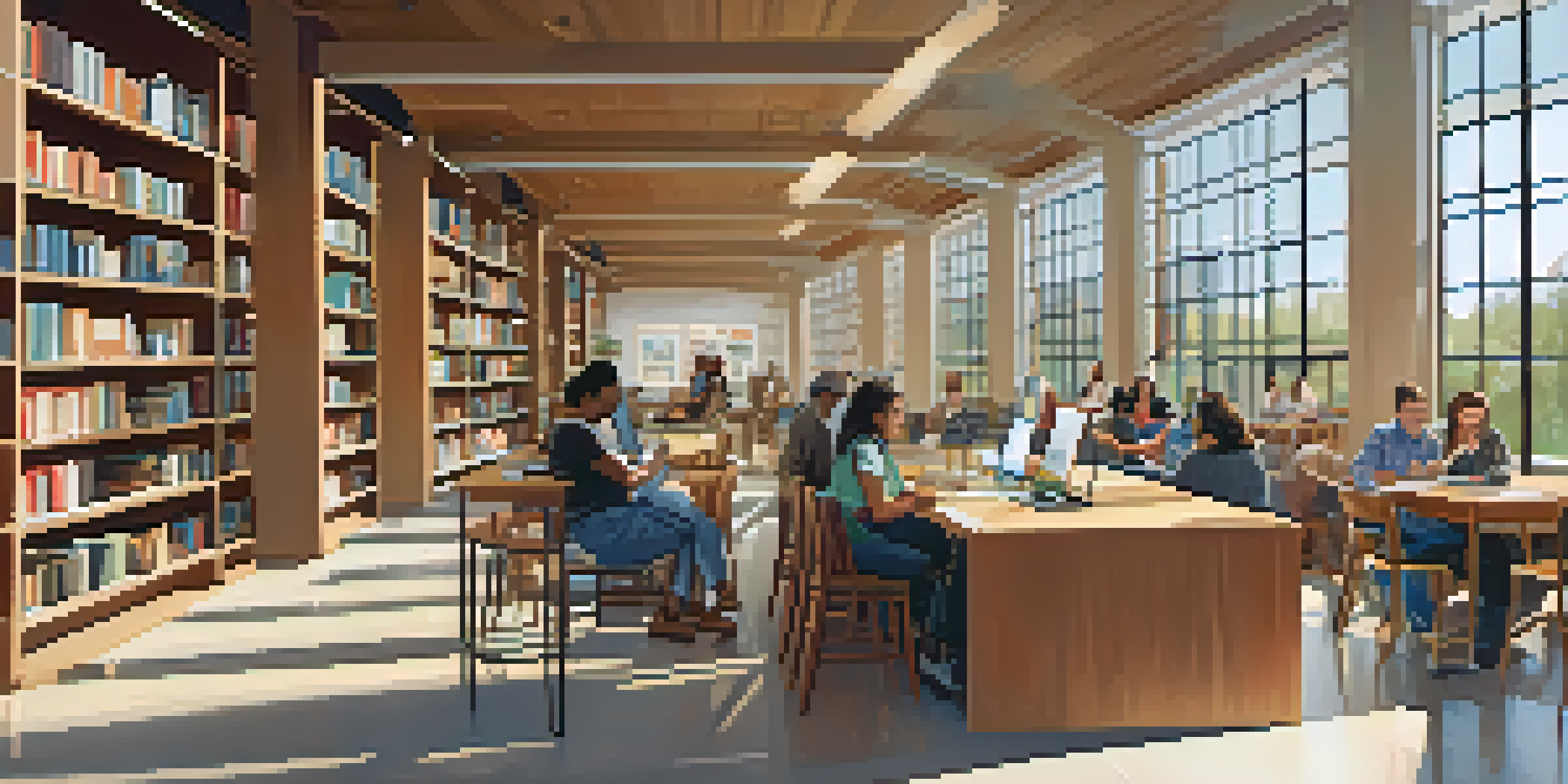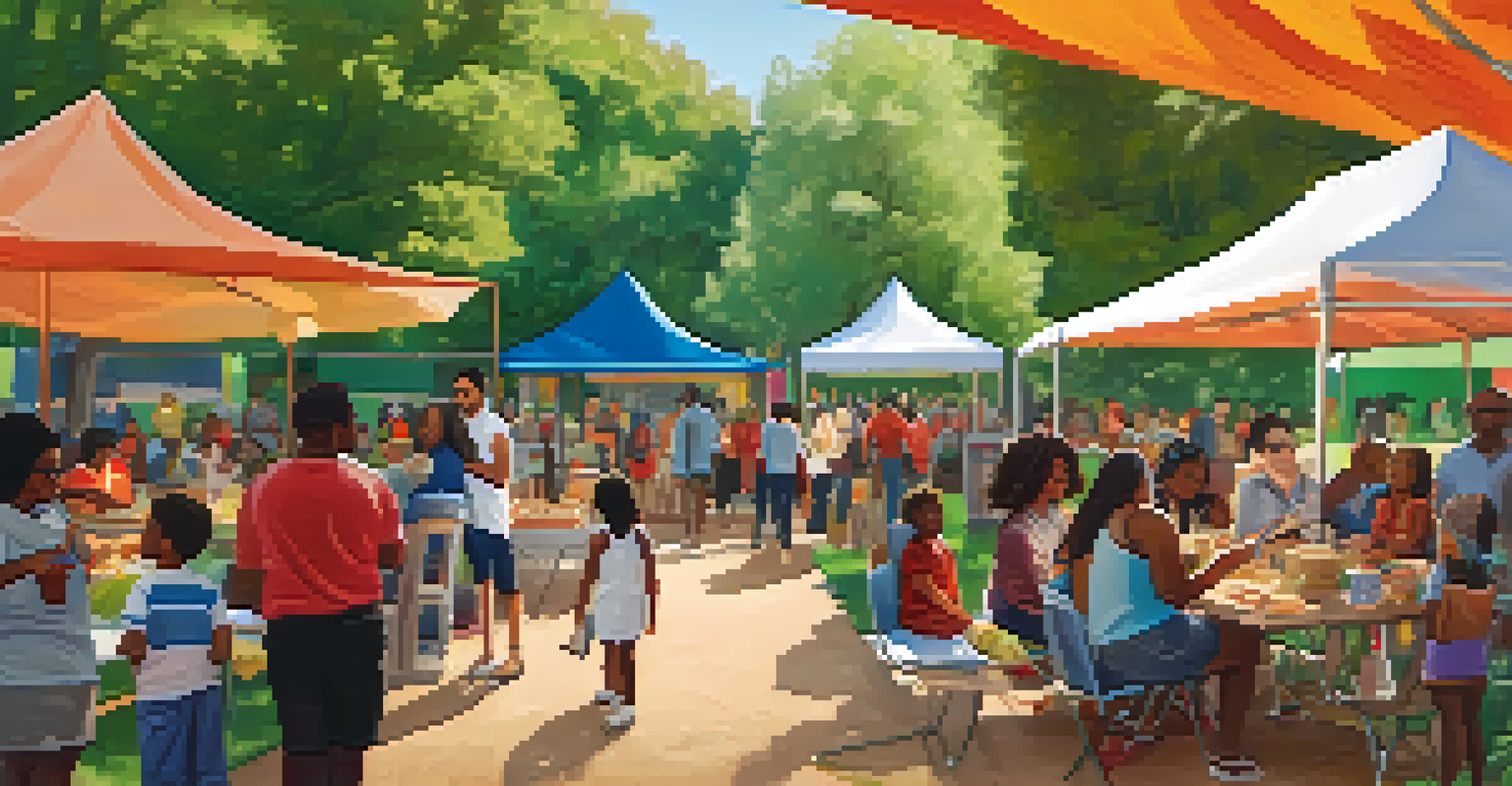Libraries as Hubs for Lifelong Learning and Education Access

The Evolving Role of Libraries in Communities
Libraries have transformed from quiet book repositories to vibrant community hubs. They now offer a range of services that cater to diverse learning needs, making them essential in today's fast-paced world. This evolution reflects the changing demands of society, where access to information is crucial for personal and professional growth.
Libraries are not just about what we have for people, but what we do for people.
In many communities, libraries serve as the first point of contact for individuals seeking knowledge and resources. They host workshops, seminars, and classes that encourage lifelong learning. By bridging the gap between traditional education and self-directed learning, libraries empower individuals to pursue their interests at any stage of life.
Moreover, libraries are now equipped with technology and resources that cater to a digitally-savvy audience. From free internet access to digital literacy programs, they ensure that everyone has the tools they need to succeed in an increasingly digital world.
Access to Resources and Services
One of the most significant roles libraries play is providing access to a wealth of resources. From books and e-books to databases and online courses, libraries are treasure troves of knowledge. This access is particularly vital for those who may not have the means to purchase educational materials.

Libraries also offer specialized services, such as tutoring programs and career workshops, that help patrons develop skills for the workforce. By collaborating with local organizations, they can tailor their offerings to meet the specific needs of their communities. This not only enhances learning opportunities but also fosters a sense of belonging.
Libraries as Community Hubs
Libraries have evolved into vibrant community centers that provide resources, workshops, and technology access to support lifelong learning.
Furthermore, libraries often provide language classes and cultural programs that celebrate diversity. Such initiatives promote inclusivity and help individuals from various backgrounds integrate into their communities, enriching the social fabric.
Community Engagement and Collaboration
Libraries are not just places for solitary study; they are dynamic spaces for community engagement. By hosting events and discussions, they encourage collaboration and idea-sharing among residents. This fosters a sense of community ownership and pride, essential elements for lifelong learning.
A library is not a luxury but one of the necessities of life.
Community partnerships are a key aspect of this engagement. Libraries collaborate with schools, local businesses, and non-profits to create programs that address specific community needs. These partnerships amplify the impact of libraries, making them a catalyst for positive change.
In addition, libraries often serve as venues for public forums and civic discussions, further solidifying their role as community hubs. By creating spaces for dialogue, they empower citizens to become active participants in their communities.
Innovative Learning Programs and Initiatives
To adapt to the needs of modern learners, libraries have introduced innovative programs that go beyond traditional offerings. Makerspaces, for example, provide access to tools and technology for hands-on learning experiences. These creative environments inspire experimentation and practical skill development.
Additionally, libraries often run coding clubs, book clubs, and other group activities that encourage collaborative learning. Such programs not only enhance knowledge but also build valuable social connections among participants. This sense of community can be a powerful motivator for lifelong learning.
Access to Diverse Resources
They offer a wide range of resources, from books to career workshops, ensuring that all individuals can pursue their personal and professional development.
Moreover, many libraries are now incorporating virtual learning options, making education accessible to even more people. Online workshops and webinars allow individuals to participate from the comfort of their homes, breaking down barriers related to transportation and scheduling.
Supporting Personal and Professional Development
Libraries are essential for personal and professional development, offering resources that cater to both areas. From resume writing workshops to professional certification courses, libraries support individuals looking to advance their careers. This commitment to workforce development is vital in today’s competitive job market.
Moreover, libraries provide access to career counseling and job search resources, helping patrons navigate the often-challenging employment landscape. By equipping individuals with the necessary tools and support, libraries contribute to economic growth and stability in their communities.
On a personal level, libraries encourage self-improvement through a variety of programs focused on health, wellness, and lifelong learning. This holistic approach ensures that individuals can pursue their passions while also enhancing their quality of life.
Promoting Digital Literacy and Technology Access
In our technology-driven world, digital literacy is more important than ever, and libraries play a crucial role in promoting it. Many libraries offer workshops on essential digital skills, such as navigating the internet, using software applications, and understanding online security. These skills are foundational for success in both personal and professional realms.
Additionally, libraries provide access to computers and high-speed internet, bridging the digital divide for individuals who may lack these resources at home. This accessibility is vital, as it empowers everyone to engage with online learning and information.
Promoting Digital Literacy
By providing digital skills training and technology access, libraries help bridge the digital divide and empower individuals in an increasingly tech-driven world.
By fostering digital literacy, libraries not only enhance individual capabilities but also help create a more informed and engaged citizenry. This commitment to technology access is a vital aspect of their mission to support lifelong learning.
The Future of Libraries in Lifelong Learning
As we look to the future, libraries will continue to evolve to meet the changing needs of their communities. The integration of technology, innovative programming, and community engagement will remain at the forefront of their mission. By embracing these changes, libraries can further solidify their role as essential hubs for lifelong learning.
Moreover, the increasing focus on accessibility will ensure that libraries remain inclusive spaces for everyone. As they adapt to the diverse needs of their patrons, libraries will foster an environment where learning is not only encouraged but celebrated.

Ultimately, libraries will continue to inspire and empower individuals to pursue knowledge and personal growth. Their commitment to lifelong learning will ensure that they remain vital resources for generations to come.